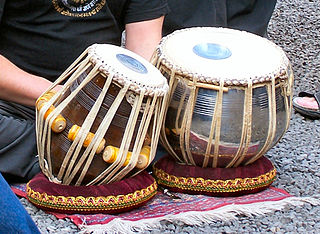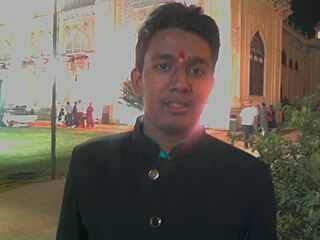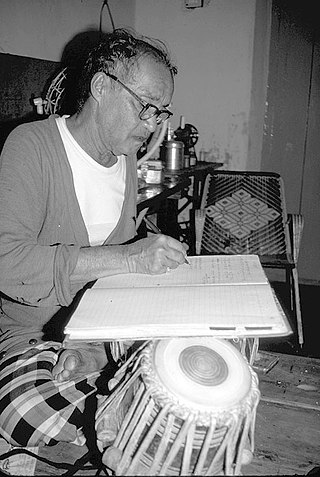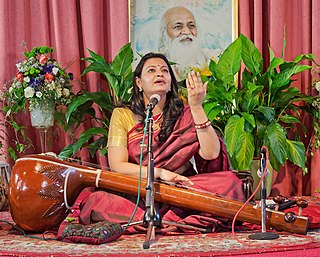Related Research Articles

Ramachandra Kundgolkar Saunshi, popularly known as Sawai Gandharva and Ram-bhau, was a popular Hindustani Classical vocalist from Karnataka. He was a master in the genre of Kirana Gharana style. He was the first and foremost disciple of Ustad Abdul Karim Khan, and guru of Bharat Ratna laureate Pandit Bhimsen Joshi.

Paṅjāb Gharānā, sometimes called Punjabi or Paṅjābī Gharānā, is a style and technique of tabla playing that originated in the Punjab region of the Indian subcontinent, now split between present-day Pakistan and India. The Punjab Gharana is considered one of the six main styles of tabla, the others being Delhi, Ajrada, Banares, Lucknow, and Farrukhabad. The repertoire of the Punjab Gharana is heavily influenced by the Pakhawaj.
Ustad Faiyaz Khan was a tabla player of international repute.
Ustad Ahmed Jan Khan "Thirakwa" was an Indian tabla player, commonly considered the pre-eminent soloist among tabla players of the 20th century, and among the most influential percussionists in the history of Indian Classical Music.
The Gwalior Gharana is one of the oldest Khyal Gharana in Indian classical music. The rise of the Gwalior Gharana started with the reign of the Mughal emperor Akbar (1542–1605).
Padma Talwalkar is an Indian classical vocalist.

Pandit Nayan Ghosh is an Indian tabla and sitar maestro. He is a tabla player from the Farrukhabad Gharana.
Farrukhabad Gharana is one of six prominent playing styles or gharanas of North Indian tabla, in Hindustani classical music, and derives its name from Farrukhabad in Uttar Pradesh.

Suresh Talwalkar is an Indian musician who plays the percussion instrument tabla.

Baba Bhaskar Nath is an Indian classical instrumentalist. He plays shehnai. Belonging from the Meerut Shehnai Gharana, he is considered a child prodigy.

Pandit Anindo Chatterjee is an Indian tabla player of the Farrukhabad gharana school. He was born into a musical family. Chatterjee is a disciple of Pandit Jnan Prakash Ghosh.

Shaikh Dawood Khan, also known as Ustad Shaikh Dawood, Ustad Sheikh Dawood and Daud Khan, was a performer on the Indian tabla. He was formerly a staff artist at All India Radio, Hyderabad, India.
Ramchandra Purushottam Marathe, also known as Pandit Ram Marathe, was a Marathi music director, singer, and actor on stage and in films. As a child actor, he performed the title role of Krishna in Prabhat Film Company's 1938 film, Gopal Krishna. He was disciple of Vilayat Hussain Khan, the maestro of Agra gharana of Hindustani classical music., Master Krishnarao Phulambrikar and others. Through Master krishnarao, he developed his Khayal style which had elements of different gharanas such as Jaipur, Gwalior and Agra.

Anokhelal Mishra — also spelled as Anokhe Lal Misra and commonly known as Pandit Anokhelal-ji — was an Indian Tablā Artist who belonged to the Banaras Gharana of Hindustani classical music.

Pandit S. Ballesh Bhajantri is a popular Indian classical Hindustani shehnai player. He is a disciple of shehnai player Ustad Bismillah Khan, he is benares gharana shehnai player and a patiala gharana hindustani vocalist, ghazal singer, Indian playback singer and musician, Ballesh is credited with popularizing the shehnai, a reeded woodwind instrument. He is also a Prasar Bharati's All India Radio (AIR) and Doordarshan artist.
Madhukar Dhumal is an Indian Shehnai Player, Composer and freelance Musician. He is a disciple of Guni Gandharva Pandit Laxmanprasad Jaipurwale and Pandit Rajaram Sukhla.He is part of many other bands and has performed with various artists around the world. Majorly performed for Bollywood industry with all known Music directors.

Pandit Ramdas Palsule is a Tabla player from Pune, India. He is also an A grade artist of All India Radio and Doordarshan.

Amit Kavthekar is an Indian tabla player known as the last ganda-bandhan of Utd. Allarakha Khansaheb and a prominent disciple of Utd. Zakir Hussain. Kavthekar is regarded as one of the leading young artists of Indian Classical music and tabla.

Meeta Pandit is a Hindustani Classical vocalist and a leading exponent of the Gwalior Gharana. She is the granddaughter and disciple of Krishnarao Shankar Pandit and daughter of Laxman Krishnarao Pandit. She is the sixth in the unbroken lineage and the first woman in the family to have taken up music as a profession.
Pandit Suresh "Bhai" Gaitonde was an Indian tabla player. He is best known for being a major disciple of Ahmed Jan Thirakwa and leading representative of the Farukhabad tradition. He was the leading exponent of Thirakwa Shailey (baaj). Sangeet Natak Academy has stored his recording in the archives as the successor of Ustad Thirakwa.
References
- 1 2 3 4 "Biographies of Tabla Players - Read Collection @Tabla Notes". Tabla Notes. Retrieved 26 August 2023.
- 1 2 3 4 5 6 7 8 9 10 "मेहबूब खाँ मिरजकर (Mehboob Khan Mirajkar)". मराठी विश्वकोश (in Marathi). 28 April 2023. Retrieved 26 August 2023.
- 1 2 3 4 5 "About". Mysite Nawazji. Retrieved 26 August 2023.
- ↑ "Tabla".
- 1 2 3 Desk, Punemirror (30 December 2008). "A taal tale". punemirror.com. Retrieved 26 August 2023.
{{cite web}}:|last=has generic name (help) - ↑ "Ustad Shaik Dawood Khan, Tabla Nawaz - Biography". chandrakantha.com. Retrieved 26 August 2023.
- ↑ "Ustad Mahboob Khan Mirajkar | Mpositive.in". 28 February 2016. Retrieved 26 August 2023.
- ↑ P.L.Deshpande. Gun Gayin Avadi. Mauj Prakashan. ISBN 9788174868299.
- ↑ "Ustad Mohammad Hanif Khan Mirajkar ❤️ राग परिचय". raagparichay.in. Retrieved 26 August 2023.
- 1 2 Reporter (23 December 2015). "Taalyogi Pt. Suresh Talwalkar to receives prestigeious 'TaalVishwa Ustad Mehboob khan saheb Award". Punekar News. Retrieved 26 August 2023.